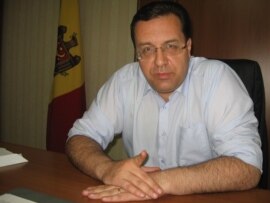Moldovan leader spreads blame for language tensions in Gagauzia
| Publisher | Radio Free Europe/Radio Liberty |
| Publication Date | 4 August 2011 |
| Cite as | Radio Free Europe/Radio Liberty, Moldovan leader spreads blame for language tensions in Gagauzia, 4 August 2011, available at: https://www.refworld.org/docid/4e4a292b23.html [accessed 5 June 2023] |
| Disclaimer | This is not a UNHCR publication. UNHCR is not responsible for, nor does it necessarily endorse, its content. Any views expressed are solely those of the author or publisher and do not necessarily reflect those of UNHCR, the United Nations or its Member States. |
August 04, 2011
 Interim Moldovan President Marian Lupu
Interim Moldovan President Marian Lupu
CHISINAU – Interim Moldovan President Marian Lupu says both the central government and the authorities in Moldova's Gagauz autonomous region share the blame for tensions over state language exams, RFE/RL's Moldovan Service reports.
This year about 10 percent of high-school students in Gagauzia – a region home to a small group of Turkic people – failed to pass their final exams in Romanian language and literature.
Local authorities blamed the central government for failing to deliver on a promise to increase funding and improve the study of the state language in Gagauzia.
They also threatened threaten to cancel the compulsory Romanian language exams for graduating students.
In an interview with RFE/RL, Lupu admitted that the central government did not do enough to improve the situation for Gagauzia's high school students. But he also accused Gagauz politicians of playing "political games."
Lupu called for calm and a negotiated solution between Gagauz authorities and the Education Ministry.
Gagauzia is a predominantly agricultural region in southern Moldova with a population of about 160,000. The Gagauz are a Turkic people who settled there about 1,000 years ago.
Although Gagauz, Russian, and Romanian are all official languages in the autonomous region, most people are Russian-speaking Orthodox Christians. Teaching in local schools is conducted in Russian, and there has historically been strong resistance to efforts to impose the Romanian language on the region.
Link to original story on RFE/RL website
